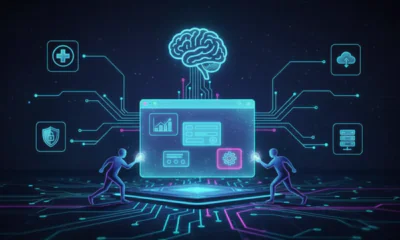Artificial Intelligence
Is Meta Llama Truly Open Source?

The software industry is increasingly embracing open-source technologies. An impressive 80% of businesses have increased their use of open-source software, according to the 2023 State of Open Source Report.
As a major player in the tech industry, Meta’s software ventures hold significant sway. Meta Llama project is a noteworthy contribution to the open-source large language model ecosystem. However, upon closer examination of its open-source claims, we can observe some irregularities.
Let’s examine Meta Llama more closely to assess its licensing, challenges, and larger implications in the open-source community.
What Constitutes Open Source?
Understanding the essence of open source is pivotal in assessing Meta Llama. Open source signifies not just accessibility to the source code but a commitment to collaboration, transparency, and community-driven development. Compared to proprietary software, open-source software is typically license-free and can be copied, altered, or shared by anyone without the author’s explicit permission.
Meta’s Llama warrants scrutiny regarding its adherence to these criteria. Evaluating Meta’s commitment to transparency, collaborative development, and code accessibility will reveal how much it aligns with open-source principles.
Overview of Meta Llama Project

Overview of Llama 2 pre-training and fine-tuning process
As a pivotal tool within Meta’s ecosystem, Llama has far-reaching implications. Its robust natural language capabilities empower developers to build and fine-tune powerful chatbots, language translation, and content generation systems. Llama aims to enable more nuanced language comprehension and generation with its adaptability and flexibility.
Crucial to Llama’s operation are the guiding principles encapsulated in the Meta’s Use Policy. These principles promote the safe and fair use of the platform and delineate the ethical boundaries governing its responsible utilization.
Applications & Impact
Meta’s Llama is compared to other prominent LLMs, such as BERT and GPT-3. It has been found to outperform them on many external benchmarks, such as QA datasets like Natural Questions and QuAC.
Here are some use cases that highlight the impact of Llama on developers and the broader tech ecosystem:
- Powerful Bots: Llama allows developers to create more advanced natural language interactions with users in chatbots and virtual assistants.
- Improved Sentiment Analysis: Llama can help businesses and researchers better understand customer sentiment by analyzing large amounts of text data.
- Privacy Control: Llama’s adaptability and flexibility make it potentially disruptive to the current leaders in LLM, such as OpenAI and Google. Its ability to be self-hosted and modified provides more control over data and models for privacy-focused use cases.
Meta’s Claims of Open Source
Meta asserts Llama’s open-source nature, positioning it within the collaborative sphere. Therefore, examining Meta’s claims becomes paramount to ascertaining practice from rhetoric.
Beyond the political correctness of open-source, it is advantageous to make Llama accessible. Some anticipated benefits include enhanced community engagement with Meta, accelerated innovation, transparency, and broader utility. However, the veracity of these claims demands meticulous scrutiny.
Meta’s Llama Licensing
Llama’s licensing model has some unique characteristics that differentiate it from traditional open-source licenses. The Llama license, while more permissive than licenses attached to many commercial models, has specific restrictions. Here are some key points:
1. Custom License
Meta uses a custom, partial open license for Llama, which grants users a non-exclusive, worldwide, non-transferable, and royalty-free limited license under Meta’s intellectual property rights.
2. Usage and Derivatives
Users can use, reproduce, distribute, copy, create derivative works of, and modify the Llama materials without transferring the license.
3. Commercial Terms
Companies with over 700 million monthly active users must obtain a commercial license from Meta AI. This requirement sets Llama apart from traditional open-source licenses, which typically do not impose such restrictions.
4. Partnerships
The Llama 2 model is accessible via AWS and Hugging Face. Meta has also partnered with Microsoft to bring Llama 2 to the Azure model library, allowing developers to build applications with it without paying a licensing fee.
Challenges and Controversies Around Llama’s Openness

The user experience within the Meta Llama ecosystem has its share of challenges, with specific instances revealing constraints on Llama models and derivatives.
- The labyrinth of license restrictions complicates the landscape, influencing how users interact with and leverage these advanced models.
- Selective access hurdles emerge, casting a shadow on the inclusivity of user participation.
- Documentation ambiguities add an extra layer of complexity, requiring users to navigate unclear guidelines.
In a recent evaluation conducted by Radboud University, several instruction-tuned text generators, including Llama 2, underwent scrutiny regarding their open-source claims. The study comprehensively assessed availability, documentation quality, and access methods, aiming to rank these models based on their openness. Llama 2 emerged as the second lowest-ranked model among those evaluated, with an overall openness score marginally higher than ChatGPT.

Radboud University’s assessment of Llama 2’s open source claims, among other text generators, as of June 2023 (Full table available here)
The developer community has also raised several criticisms and concerns about Llama:
- The lack of transparency in Meta’s handling of the model.
- The restrictions on usage and derivatives.
- The commercial terms imposed on large companies.
Meta’s Response
Meta’s Llama has been debated regarding its true openness. While Meta has described Llama 2 as open-source and free for research and commercial use, critics argue that it is not fully open-source. The main points of contention are the availability of training data and the code used to train the model.
Meta has made the model’s weights, evaluation code, and documentation available, which is a significant aspect of an open-source model. However, Llama 2 is considered somewhat closed off compared to other open-source LLMs. The model’s training data and the code used to train it are not shared, limiting the ability of aspiring developers and researchers to analyze the model fully.
Preserving Open-Source Integrity

Accepting partially open-source projects as open-source can be detrimental to the credibility of open-source practices in the industry. Some potential impacts include:
- Discouraged Collaborative Synergy: Mislabeling non-open-source projects could deter potential collaborators, hindering the vibrant exchange of ideas and collective problem-solving that defines open source.
- Inhibited Innovation Spectrum: Embracing closed-source projects as open-source might stifle innovation by leading developers down paths that lack the communal, unrestricted creativity pivotal for breakthroughs.
- Confusion and Adoption Hitch: Misidentifying closed-source as open-source may confuse users and developers, resulting in hesitancy to adopt genuinely open initiatives due to skepticism or unclear distinctions.
- Legal Labyrinth: Accepting non-compliant projects may raise legal issues, adding complexity and potential liabilities and disrupting the community’s ethos of transparency and cooperation.
To address these potential consequences, the open-source community must uphold the true spirit of open-source. Clearly defining and communicating the principles and values of open source can help prevent confusion and ensure that projects accepted as open source align with these principles.
For the latest insights into technology and AI, visit Unite AI. Stay informed and stay ahead with us!












